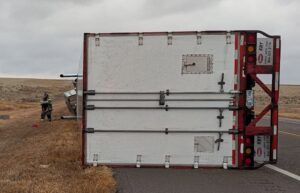GRAIN VALLEY, Mo. — Owner-Operator Independent Drivers Association President Todd Spencer said several comments made by Lane Kidd, managing director of The Trucking Alliance, in a recently-published article in a trucking trade publication on the subject of hair testing were misleading.
“I feel compelled to respond,” Spencer said in a “Tandem Thoughts” online column on Land Line Now, OOIDA’s news and commentary website, as he addressed the article in FreightWaves concerning hair testing of commercial vehicle drivers.
“First, there is no legislative mandate requiring commercial truck drivers to be hair-tested,” Spencer said. “Federal law requires the Substance Abuse and Mental Health Services Administration (SAMHSA), in coordination with other federal agencies, to report to Congress on its progress in developing guidelines that might potentially address the use of hair-testing.”
Spencer was describing a comment from Lane Kidd, managing director of The Trucking Alliance, asserting there is an opioid epidemic in the trucking industry was “irresponsible.” Spencer said that Kidd presented no evidence to validate such a comment and that there is no evidence to support such a claim.
Quite the contrary, Kidd said in response.
“Current opioid abuse is alarming,” he said. “J.B. Hunt released new data at a United Nations meeting this spring. In 2017, there were 1,213 people, or 7.7 percent of all applicants, who tested positive for drugs, a 2 percent spike over the company’s average. Opioids accounted for 48 percent of the illegal drug use. Cocaine was second.”
Kidd said in the FreightWaves article that The Trucking Alliance would actively encourage the U.S. Department of Transportation to proceed with a rulemaking as soon as possible.
“Our data show that a urine exam is missing as many as 90 percent of all opioid and illegal drug abusers who are applying for work as a truck driver,” Kidd said in the article. “That’s a danger to the public and a risk to motor carriers. The trucking industry has an opioid crisis and we must reform the system to make sure that opioid abusers are not operating large trucks on the nation’s highways.”
Spencer said the reality is that positive test results among truck drivers are so low – less than 1 percent, actually – that the Federal Motor Carrier Safety Administration reduced the percentage of drivers that must be randomly tested.
Kidd responded to Spencer’s assertion of no evidence in an e-mail to The Trucker.
Kidd said since 2006, J.B. Hunt Transport, one of the freight transportation’s largest employers, has relied on two drug tests before hiring a job applicant. The company requires a urine test, the only method recognized by the Department of Transportation. Hunt also requires applicants to pass a hair exam, which is not recognized by USDOT.
“Hunt correctly justifies a hair exam because that method more accurately identifies lifestyle drug users,” Kidd said. “Urine tests can reveal drug use, but only for several hours before a test is conducted.”
As of September 2018, Hunt reported that 131,364 job applicants were asked to take a urine and hair exam. There were 6,786 people, or 5.17 percent, who either failed or refused to take both drug tests.
“But here’s the kicker,” Kidd said. “The urine test failed to catch 86 percent of the drug users. Almost nine out of 10 drug users passed their urine test. Only the hair exam identified the drugs in their systems. Most of those truck driver job applicants presumably found jobs at other trucking companies that only require the urine test. Clearly, the urine test is not a realistic barometer of drug use, either at pre-employment or in the various random drug test protocols out there.”
Spencer said the FreightWaves article cites a 2017 study conducted by the Governors Highway Safety Association that found that 22 percent of drivers tested positive for “some drug medication.” Spencer added that the study does not indicate how many of the individuals who tested positive were truck drivers, nor did it identify the types of medications that were present or what health conditions the medications were prescribed for. Further, it also ignored the fact that the appropriate use of medications to treat medical symptoms can actually improve the well-being of a truck driver and highway safety, he wrote.
Spencer noted that The Trucking Alliance was quoted correctly as saying that federal law requires potential guidelines to ensure that individuals within the trucking industry who might be exposed to certain drugs do not register a false positive.
“However, there is no standard protocol for hair-testing, nor has there been any validated or reliable testing of hair samples allowing SAMSHA to propose guidelines that are scientifically valid,” he wrote. “SAMSHA has reported this lack of science-based protocol and should be commended for not bowing to special interest groups promoting tests that could adversely affect drivers based on false information.”
Spencer said the Trucker Alliance was pushing for mandatory hair-testing to mitigate carriers from liability.
“While hair-testing can show the presence of various substances in an individual, The Trucking Alliance fails to show how such testing would prove driver impairment while operating a commercial motor vehicle,” he said, adding he was confident The Trucking Alliance would continue to push for hair-testing, speed limiters, increased insurance minimums, and other federal mandates that disadvantage small-business carriers and infringe upon the rights of drivers, while at the same time complaining about a perceived driver shortage.
“If any group deserves a shortage, it’s them,” Spencer concluded.
The Trucking Alliance describes itself as “a coalition of freight and logistics companies that are working together to increase safety for commercial truck drivers, reduce the number of large truck accidents, and improve highway safety for the general public throughout the United States.”
The Trucker News Staff produces engaging content for not only TheTrucker.com, but also The Trucker Newspaper, which has been serving the trucking industry for more than 30 years. With a focus on drivers, the Trucker News Staff aims to provide relevant, objective content pertaining to the trucking segment of the transportation industry. The Trucker News Staff is based in Little Rock, Arkansas.








